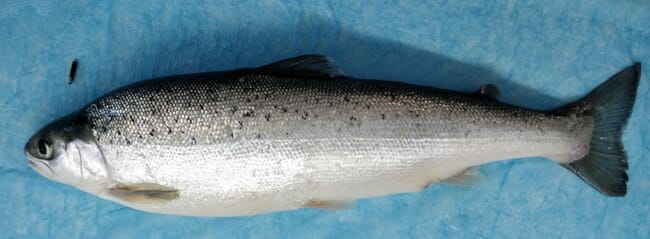
The tags emit a unique code when a magnetic field is set up, allowing researchers to recognise the different individuals. © Tina Oldham, HI
Passive integrated transponder (PIT) tags allow researchers to follow each individual salmon over time. Signals from the tags provide information about, among other things, where the various fish swim in the cages, and how environmental conditions affect growth, health and welfare.
The tags are usually placed in the abdominal cavity of the fish, but these can easily end up in the fillet, making the fish unsuitable to eat, so researchers have now investigated an alternative method to allow for research in commercial cages.
At IMR’s research station in Matre, 798 farmed salmon weighing between 159 and 595 grams were tagged. Half had the tags inserted into their abdominal cavities, while the other half had them inserted into the gill covers.
“Our results show that the alternative method is as good as the traditional method,” said researcher Tina Oldham, in a press release.
After tagging, the salmon was randomly distributed in two different vessels at the research station. Four days later, as part of another experiment, the fish were subjected to handling.
“Most of the fish were mechanically de-liced in various ways, while a small group of control fish were only examined and put in a new vessel,” the researcher explained.
After handling, increased mortality was registered for the fish of 2 per cent, but this was evenly distributed between the two brand groups.
The researchers checked daily how the fish were doing. At the end of the experiment, they did more extensive welfare surveys; they checked what the fish looked like, whether they had wounds, or in any other way had been damaged by the tags.
“The fish had good welfare, and there were few differences between the fish that were tagged with the two different methods,” said Oldham.
After two weeks, eight percent of the fish tagged in the abdominal cavity, and 6 percent of the fish tagged in the gill cover, had lost their tags.
“This knowledge makes it possible to use PIT marks in our research in commercial salmon cages,” said Oldham.
Oldham, Tina, Georgia Macaulay, Malin Stalheim and Frode Oppedal. "Operculum PIT tagging: a viable alternative to avoid human consumption in processed salmon". Animal Biotelemetry volume 9, Article number: 39 (2021). Link: https://doi.org/10.1186/s40317-021-00261-z


